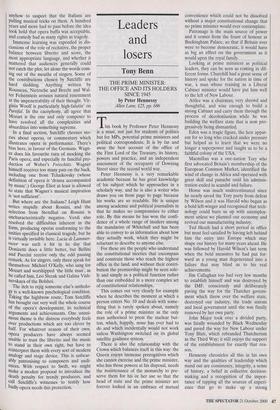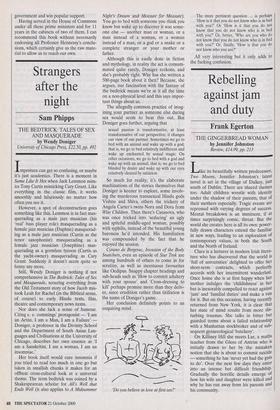Leaders and losers
Tony Benn
THE PRIME MINISTER: THE OFFICE AND ITS HOLDERS SINCE 1945 by Peter Hennessy Allen Lane, 125, pp. 686 his book by Professor Peter Hennessy is a must, not just for students of politics but for MPs, potential prime ministers and political correspondents. It is by far and away the best account of the office of the First Lord of the Treasury, its history, powers and practice, and an independent assessment of the occupants of Downing Street since the second world war.
Peter Hennessy is a very remarkable academic because he has great knowledge of his subject which he approaches in a scholarly way, and he is also a writer who draws you on from page to page because his works are so readable. He is unique among academic and political journalists in that he makes no compromises to either role. By this means he has won the confi- dence of a whole range of insiders among the mandarins of Whitehall and has been able to convey to us information about how they actually work, which they might be reluctant to describe to anyone else.
For these are the people who understand the constitutional niceties that encompass and constrain those who reach the highest office in the land, and without their contri- bution the premiership might be seen sole- ly and simply as a political function rather than one embedded in a more complex set of constitutional relationships.
This comes out very clearly for example when he describes the moment at which a person enters No. 10 and deals with some- thing that is rarely spoken about, namely the role of a prime minister as the only man authorised to press the nuclear but- ton, which, happily, none has ever had to do and which incidentally would not work unless Washington switched on its global satellite guidance system.
There is also the relationship with the Crown which balances itself in this way: the Queen enjoys immense prerogatives which she cannot exercise and the prime minister, who has those powers at his disposal, needs the maintenance of the monarchy to pre- serve them for his or her use so that the head of state and the prime minister are forever locked in an embrace of mutual convenience which could not be dissolved without a major constitutional change that no prime minister would ever contemplate.
Patronage is the main source of power and it comes from the fount of honour at Buckingham Palace, so that if Britain ever were to become democratic, it would have as big an effect on the government as it would upon the royal family.
Looking at prime ministers as political leaders, they can be seen as coming in dif- ferent forms. Churchill had a great sense of history and spoke for the nation in time of war, a man whose training as a Liberal Cabinet minister would have put him well to the left of New Labour.
Attlee was a chairman, very shrewd and thoughtful, and wise enough to build a strong Cabinet and carry them through the process of decolonisation while he was building the welfare state that is now pro- gressively being dismantled.
Eden was a tragic figure, the heir appar- ent for so long who cracked under pressure but helped us to learn that we were no longer a superpower and taught us to be a faithful colony of the USA.
Macmillan was a one-nation Tory who first advocated Britain's membership of the European Common Market, identified the wind of change in Africa and operated with great skill and panache until his adminis- tration ended in scandal and failure.
Home was much underestimated since he nearly saved the Tory party from defeat by Wilson and it was Harold who began as a bold left-winger and recognised that tech- nology could burn us up with unemploy- ment unless we planned our economy and revived our manufacturing industry.
Ted Heath had a short period in office but must feel satisfied by having left behind him the entry into Europe which may shape our history for many years ahead. He was followed by Harold Wilson's last term when the bold measures he had put for- ward as a young man degenerated into a failure that may blind us to his real achievements.
Jim Callaghan too had very few months to establish himself and was destroyed by the IMF, consciously and deliberately paving the way for the Thatcher govern- ment which threw over the welfare state, destroyed our industry, the trade unions and local government until she was finally removed by her own party.
John Major took over a divided party, was fatally wounded by Black Wednesday and paved the way for New Labour under Tony Blair, which rebranded Thatcherism as the Third Way; it still enjoys the support of the establishment for exactly that rea- son.
Hennessy chronicles all this in his own way and the qualities of leadership which stand out are consistency, integrity, a sense of history, a belief in collective decision- making and a recognition of the impor- tance of tapping all the sources of experi- ence that go to make up a strong government and win popular support.
Having served in the House of Commons under all these prime ministers and for 11 years in the cabinets of two of them, I can recommend this book without necessarily endorsing all Professor Hennessy's conclu- sions, which certainly give us the raw mate- rial to allow us to reach our own.


























































































 Previous page
Previous page